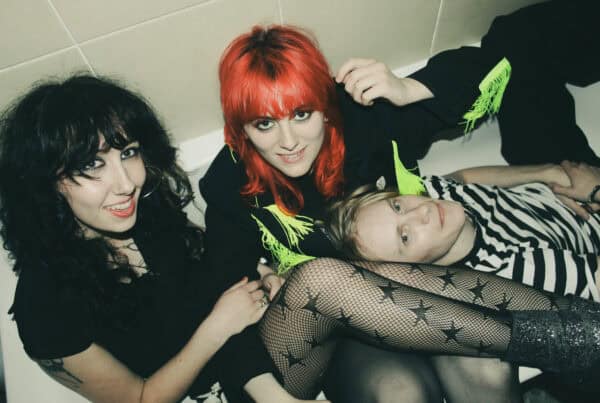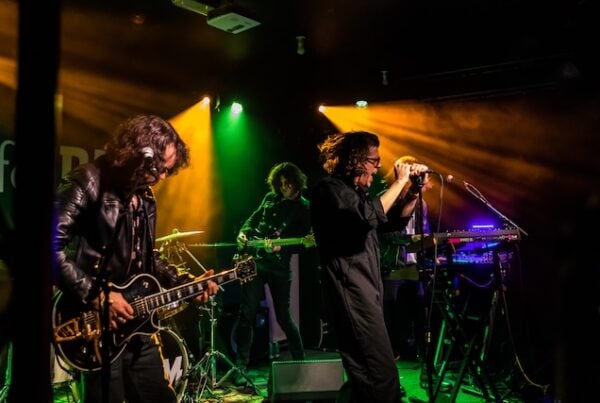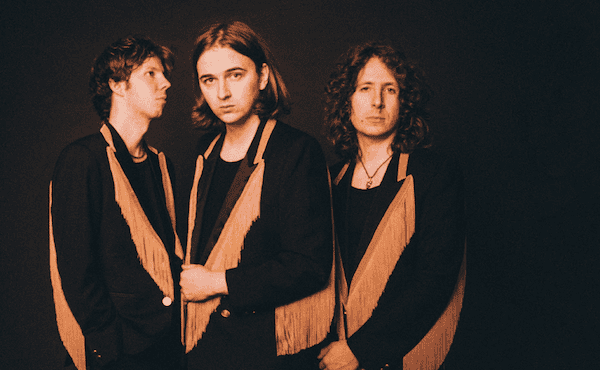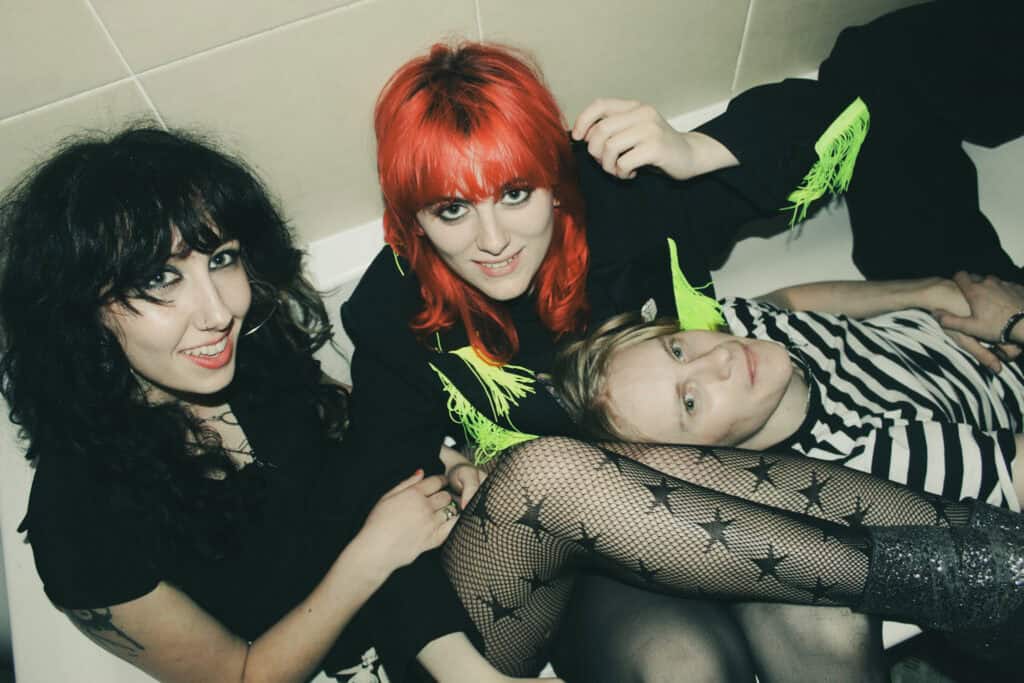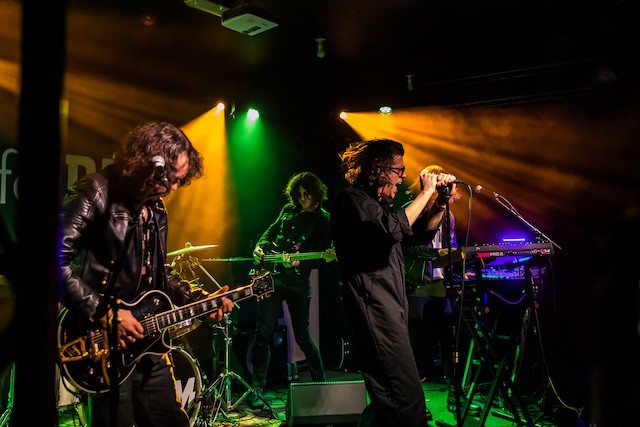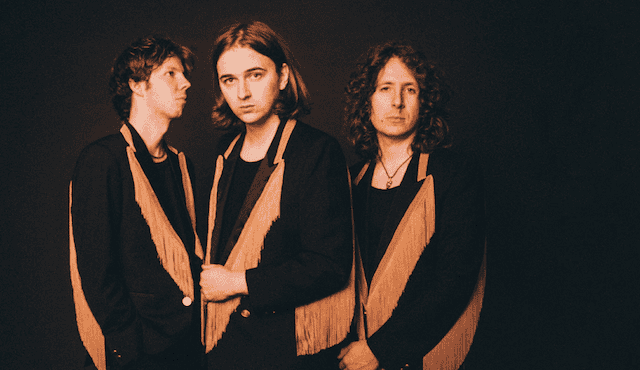Embarking on their first UK and European tour for over three years, The Rural Alberta Advantage return to these parts to delight with their brand of folk-tinged indie rock with powerful, fast drums and lead singer Nils Edenloff’s distinctive, emotionally charged voice. Having released their third album ‘Mended with Gold’ at the end of September this year to critical acclaim and garnering a dedicated following on this side of the pond that may not be the size of their fanbase in their native Canada but is definitely substantial, the band’s rise in popularity since the early days of ‘Hometowns’ has largely been down to word of mouth and their sheer tenacity. We chatted to the band at the Brudenell Social Club in Leeds to discuss that process, the tour, song inspirations and much more:

From left to right: Amy Cole (keyboards, backing vocals, various), Paul Banwatt (drummer), Nils Edenloff (guitarist, lead singer)
[like_to_read][/like_to_read]
S] So guys, what can you tell us about how you all got together to make the band?
Nils Edenloff] “It started at an open mic night that we hosted, which is where Paul and I started to play together. I remember Amy didn’t want to degrade herself by playing but we were like “we do!” and we just did that for a while. Because no one would come to the open mic night and play, in order to get the beer and food that we would be given that night we would come up with our own songs and play a bunch of covers. Basically the start of The RAA came with that open mic night, and as much as we’ve toured and recorded and stuff I don’t think we’ve deviated that much from those very early days. We’ve added things and refined it but that general feel of acoustic folky guitar songs with crazy drums was born at an open mic night in Toronto in front of nobody but a barkeep.”
Amy Cole] “I would come watch!”
NE] “When we started thinking of ourselves as a band there were a bunch of us, and then it was just Paul and I, but we felt like there was something missing.”
Paul Banwatt] “Yeah, we felt like we were just taking that open mic night schtick on the road!”
AC] Yeah, and no one was watching. Apart from me.”
NE] “It was a case of ‘no one’s coming out? You should have us on!’ We’ll bring nobody!”
S] Did you all know what you wanted to do in the band?
PB] “Well, it normally started with Nils who brought in all these songs and would play them solo on the guitar at the open mic night. Amy and I started going because we were in a band so we would be playing some of our stuff too and then back him up on the songs. Since we were doing this week after week we’d start putting together arrangements and developing beats to songs and then eventually we had at least a live set’s worth of stuff which we then ended up working out in to real material that we could play.”
AC] “Paul and Nils brought me in because they felt like something extra needed to happen but they didn’t know what, so I’d just play whatever needed playing which is sort of how all of our roles developed. If Nils for example is playing something on guitar I would probably play something on keyboard, and stuff like that. My role has grown as we’ve grown as a band I think and as we’ve all become better musicians. Nils will then decide which instrument to play based on our group sessions and it goes back and forth like that. There’s a song on the new album called ‘On the Rocks’ that started out as a guitar song back in 2005 so we’ve been working on it for years and finally decided on our roles in the song, so it always evolves in that sort of way.”
S] Is that how it developed in to Hometowns [the band’s first record]?
NE] “A friend of Paul’s wanted to start a record label and we had these songs so when he got us some time with the guy who ended up making our first two records we decided to take the chance. We spent a year recording one night a week and then right as we were about to finish he said that he didn’t want to make a label anymore, obviously because the record was too much for him to handle! So we ended up putting the record out ourselves and touring a bit and it became a word of mouth thing, we would tell friends and family about it so it slowly started to grow. eMusic picked it up and championed it for us at the end of the year and we ended up playing SXSW and getting a booking agent, which led to us meeting Saddle Creek Records, and it all just kept on snowballing from there as we just started playing for as many people as we could.”
PB] “As soon as that eMusic thing happened suddenly people knew about us.”
NE] “It was weird because we were going to places where for all intents and purposes we shouldn’t have been able to draw anybody and never really did any promotion but we’d go out and there’d be people there who knew all the songs and stuff. It was a great way to start touring and we definitely felt really lucky that it all happened.”
S] Would you say that you normally write songs as a group?
AC] “We develop them as a group, but Nils usually comes in with the original idea which is sometimes really specific and something for us to think about. Paul and Nils work together a lot on structure and I’m there to offer whatever really.”
NE] “Yeah, the drums are a fairly early stage of the developing process which is why they’re so prominent and such an integral part of the band. When I’m working on ideas I’m throwing them at Paul and we’re bouncing them off each other which is nice. It’s different to some other bands that maybe have the lead singer write the song and then just say, ‘do your thing drummer man’, which isn’t as collaborative.”
PB] “Yeah, I’ve been in bands where the songwriter who doesn’t really play drums has told me exactly what to play. It’s not every songwriter that will let you be creative and change a song or work with them to change a song completely which is different from where it started. That’s what we thrive on, and every time it changes it seems to get better.”
NE] “It takes the process away from a guy writing a song in his bedroom to a band working on something that is greater than the sum of its parts.”
PB] “It takes a real lack of ego. There are times where I’m telling Nils to totally change the whole thing and he goes and does it and it always ends up better, and vice versa too if I put some wacky beat on a song Nils will just say, ‘I hate it’ and the next thing that comes around is better than the last. We’re also willing to try every wacky idea and even if there’s something remotely cool about it we’ll record it and listen back to it a couple of months later just to figure out if there was actually anything good about it, which just lets us experiment even if it doesn’t work.”
AC] “That’s what helped us on the latest record. We had a very thorough pre-production process where we went in individually and got to talk about what we thought. We had skeletons of songs which Nils would just play as a sketch which we’d take and work out what it needed individually. That was really helpful because it gave us to space to feel free creatively which sometimes in hard when there’s three of us in a tiny room trying to get our ideas out, so just being able to lay it all down and say “here’s what I think” and talk about the songs and what did and didn’t work. For me this record feels fuller than the last one because we all got to throw a bunch of stuff at the wall and see what stuck.”

Cover of latest album ‘Mended With Gold’
S] Was the latest record a much tighter process than the other two albums?
AC] “It was different. Sometimes we just didn’t know what we were doing and we were just like ‘let’s make a record I guess’. The process of making ‘Departing’ [the band’s second album] felt very pressurised and every song was really meticulously thought about to the extent that we might have been overthinking it sometimes because it was scary how permanent something like a record is.”
NE] “I think with this record in terms of the first day vs the last it was a much tighter timeframe than with ‘Departing’ where we had a lot of songs that were more or less ready to go, so with this one there was a lot more writing that happened in a short amount of time actually. It felt good to see the finished product and be happy with it because I was really scared as we were closer and closer to being ready because I felt I didn’t understand the songs enough at the time whereas with ‘Departing’ we had a clearer vision of the songs I think.”
S] It’s clear that Alberta has had a great influence on the band, from the name through to the song titles and the content of the songs. Would you say that it’s your main source of inspiration?
NE] “When I moved to Toronto from Alberta it was a little bit overwhelming and intimidating because of the size and scope of the place and everything going on there, so I got to thinking that the only way to do something unique and special is to write songs from my own perspective and about memories that I specifically have. That was what started this trend of songs that are about places there, that effect of moving away from a place I’d always known and trying to find my place in the world ended up being a large part of it and having Alberta as the backdrop made sense. People ask me if it is going to stop, but that’s probably not going to happen because it’s part of who I am as a person.:
PB] “I think he just has a map of Alberta and a few darts which he throws to see where the next song is going to come from!”
S] Would you all say you had common musical influences, and does that help in making the records?
PB] “I think we’re all super different.”
NE] “There are some commonalities and overlapping parts where we all agree, but it’s very different which is good because we have different perspectives, which does help I guess.”
S] What would be the albums that you’d say are the most influential for each of you in particular?
PB] “For me I think the first four Led Zeppelin albums were a huge influence in terms of the way I learnt to play drums. I would put my headphones on and keep trying and failing to play along. By the time I was in the band I wasn’t really listening to that stuff any more but it was how I learned to play to drums, so that was where my style came from I think. Then I started listening to dance and hip-hop, so I think that stuff all turned in to whatever my style is now.”
NE] “I’ve always been in to folky singer-songwriter stuff like Leonard Cohen and the other classic Canadians. I’d be lying as well if I said I wasn’t a fan of ‘Airplane Over the Sea’ [Neutral Milk Hotel’s second and currently final album] so I would say stuff where the melody of the songs is at the front and centre and hooks you in with a hardiness and an earnestness to it.”
PB] “I think Nils has had a big influence on me recently just sharing stuff that he was in to, bands like Neutral Milk Hotel, Yo La Tengo and The National, bands that I hadn’t thought about before but now I would say that I’m a fan of.”
AC] “I think we all influence each other and bring music that we’ve been listening to in to the van and give it all a chance.”
S] Are there ever times when you feel particularly inspired by an album or artist when you go in to record?
AC] “I remember for the last record The Black Keys had a new record out and I liked what they did with their percussion in particular which we had never done in that way. I remember talking about that with the producer and wanting to do something a bit like it for a song or two, so it does happen sometimes. I think you can’t help it sometimes.”
NE] “Before we started recording we were all sharing songs and discussing what we liked about them, their different aspects and things. Looking at the songs helped us learn about the recording process where before we may not have known enough about what to do.”
AC] “It also helped to have examples when we didn’t know quite what we wanted and could use another song as a way of explaining what we wanted to each other. Sometimes language isn’t enough to do that and music helps.”
S] Is there a sound that you’ve tried to evolve over the course of your records or is it a case of considering each record on its own and starting the process again?
PB] “I don’t think we started again. I think we look at what we liked about our last record and try to build on that and get away from the stuff that we wished we’d done better. We like our sound and think that it’s somewhat unique or at least not all over the place, and that feel is what we try to hang on to. It’s the other stuff, we wanted our first two records to sound bigger than they sounded but we decided to build upon what we really liked about those first two.”
NE] “I always saw ‘Departing’ as being a continuation of ‘Hometowns’ whereas with this one we’ve definitely tried to refine and improve on going in to it. We’ve never really been a band with a large long term plan so it’s always a case of refining and working on what we’ve done before and seeing where that takes us.”
PB] “I don’t really know how bands manage to go in some crazy new direction and do it well and I think a lot of times when bands try it doesn’t work out. Your fans like you for what you are and not necessarily for something you’re not as good at so it’s hard to know what right we would have to do that when we’ve spent literally ten years crafting our sound. So I think evolution is important but unless something serious changes I don’t imagine a radical departure from what we do, which we have fun doing.”
NE] “I think The National are a good example of a band that have done the same thing but they do it well. The records aren’t super different but they’re also shades of the same colour. I like that personally because there is a consistency to it and all the songs have a particular character. I think with our records we try to do the same thing, something that’s a different shade to our others, but fits in to our world.”
S] Would you say other Canadian bands that you tour with, like July Talk, have an influence on you?
AC] “Definitely. I think the bands that we tour with always influence us. July Talk made us step up our live performance since theirs is so incredible, making sure they have the audience in the palm of their hand. They make us amp it up and give it our all as well to keep up with them, so we really go for it and try to keep the audience as engaged as they manage to. We’re currently touring with PS I Love You who radiate this energy that makes you want to improve your set too, and that’s all you can ask for from a band that you’re touring with.”
NE] “It also helps when none of the guys you tour with are dick rockstars, and we’ve managed to avoid people like that completely.”
PB] “We’ve toured with lots of band managers that are jerks though!”
S] What’s been your favourite thing about this tour and what are you most looking forward to for the rest of it?
NE] “We had a day off so I got some nice scotch up in Scotland when we went to a distillery, which was great.”
PB] “We also went to a honey farm that’s owned by our tour manager’s family which was really interesting. It hasn’t been our typical tour, they don’t really include distilleries and honey farms, which has been amazing!”
NE] “We haven’t had a long tour in a really long time, so just doing that and talking and meeting to people has been great. It has felt good to play these shows and know that people haven’t forgotten us after so long.”
The RAA’s third record, ‘Mended With Gold’, is out now. The band are currently touring Europe, for dates, click here

